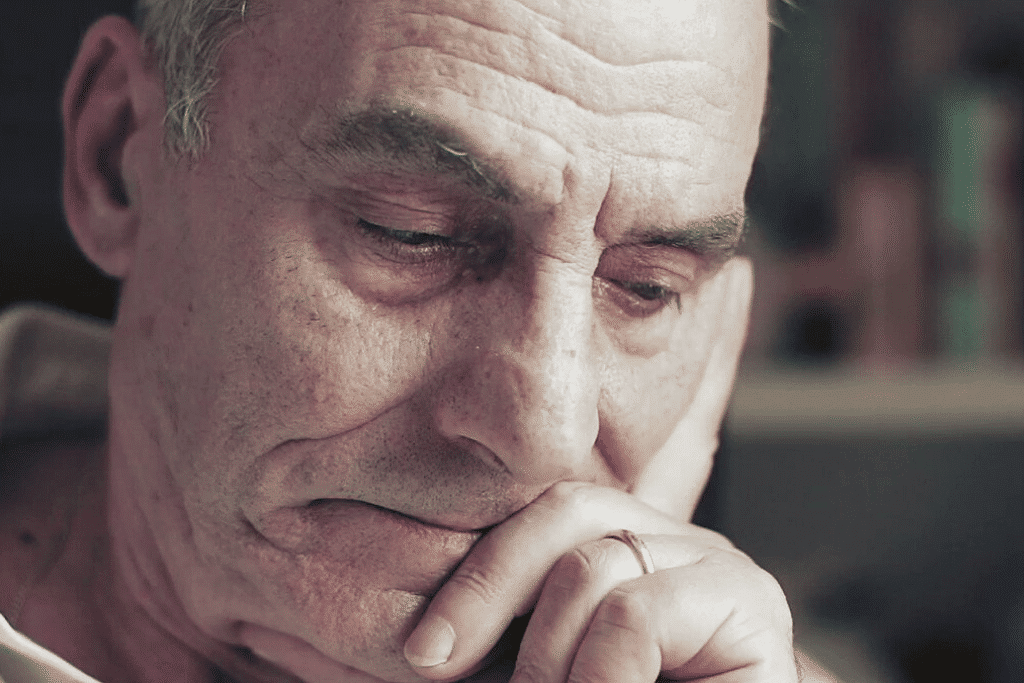Depression can happen to any of us as we age. The symptoms of elderly depression can affect every aspect of your life, impacting your energy, sleep, appetite, hobbies and relationships.
Many depressed older adults, unfortunately, fail to recognise the symptoms of depression or fail to take the necessary steps to get the help that they need.
There are countless reasons why depression in elderly people is often overlooked:
- The assumption that there is a good reason to be down and that this is a part of ageing.
- You may be isolated therefore there isn’t anyone around to notice your distress. Being isolated can equally lead to feelings of depression.
- You may be unaware that your physical complaints are signs of depression.
- The reluctance to talk to anyone about your feelings or ask friends and family for help.
It’s important to note that depression isn’t part of ageing, nor is it a sign of weakness. It can affect anyone, at any age no matter the circumstances. Life changes as you age; retirement, declining health or the loss of a loved one can all trigger depression.
No matter the challenges faced as you age, there are steps you can take to boost your outlook and feel hopeful and ready to enjoy your retirement years.
The symptoms of depression in older adults
Recognising the signs of depression in elderly adults is the first step to seeking help. Some of the symptoms include:
- Feelings of sadness and despair
- Unexplained aches and pains
- Loss of interest in socialising
- Unexplained weight loss or loss of appetite
- Feelings of helplessness or hopelessness
- Lack of energy and motivation
- Sleeping problems (difficulty falling asleep or staying asleep, oversleeping, or sleepiness during the day)
- Worries about being a burden
- Feelings of worthlessness
- Slowed movement or speech
- Increased use of alcohol or other drugs
- Frequent thoughts of suicide
- Memory problems
- Neglecting personal care
It’s important to note that while depression and sadness might seem to go hand and hand, many depressed elderly adults claim not to feel sad at all. They may instead feel that they feel low levels of motivation, a lack of energy, or physical problems.
As we age, we face life changes that can increase the risk of depression. These life changes include:
- Health problems: Illnesses, disabilities, chronic or severe pain, cognitive decline can all be contributors to depression.
- Feelings of loneliness and isolation. Factors such as living alone, a dwindling social circle due to relocation, or children fleeing the nest, decreased mobility due to illness, or loss of driving privileges can trigger depression.
- A reduced sense of purpose. Retirement can bring with it a loss of identity, status, self-confidence, and financial security and increase the risk of depression. Physical limitations on activities you used to enjoy can also impact your sense of purpose.
- Fears. These include a fear of death or dying as well as anxiety over financial problems or health issues.
- Recent bereavements. The death of friends, family members, and pets, or the loss of a spouse or partner are common causes of depression in older adults.
Medical conditions that can cause depression in older adults
Some medical problems can cause depression in older adults and the elderly, either directly or as a result of the illness.
Chronic medical conditions, especially if they are painful, debilitating or life-threatening, can lead to depression or can make your symptoms worse.
Some of these conditions include:
- Parkinson’s disease
- Cancer
- Heart disease
- Stroke
- Dementia and Alzheimer’s disease
- Multiple sclerosis (MS)
- Thyroid disorders
- Diabetes
- Vitamin B12 deficiency
- Lupus
The difference between dementia and depression
The loss of mental sharpness shouldn’t be assumed to be a sign of old age. It could be a sign of either depression or dementia. Depression and dementia share many similar symptoms, including memory problems, sluggish speech and movements so it can be easy to assume it’s one of the other.
| Symptoms of Dementia | Symptoms of Depression |
| Mental decline happens slowly | Mental decline is relatively rapid |
| Often confused and disoriented (you become lost in familiar locations) | You know the correct time, date, and where you are |
| Difficulty with short-term memory | Difficulty concentrating |
| Writing, speaking, and motor skills are impaired | Language and motor skills are slow but normal |
| You don’t tend to notice your memory problems | You notice or worry about your memory problems |
Whether the symptoms are caused by dementia or depression, it’s important to see a specialist
If it’s depression, your memory, concentration, and energy will return with treatment. Treatment for dementia will also improve your quality of life.
It’s often thought that as we reach a certain age, it’s difficult to learn new things or make fresh lifestyle changes. This is, in fact, false because the human brain never stops learning, so as an older adult, you are just as capable as a young person of learning new things and adapting to new ideas, ideas that can help you to recover from depression.
It’s possible to overcome depression by finding new things you enjoy, staying physically active, and feeling (and maintaining) connected to your loved ones.
Understandably, when you’re feeling depressed, taking action can be hard. Just thinking about the things you should do to help yourself to feel better can be overwhelming. Taking small steps can make a big difference in how you feel. You can start by taking a short walk, the fresh air can boost your mood for the next few hours. Taking small steps day by day, you can ease your depression symptoms and you’ll find yourself feeling more hopeful again.
1. Reach out to friends and family
If you’re suffering from depression, you may not want to do anything or see anyone. However, isolation can make depression worse as it can be difficult to maintain perspective and sustain the effort needed to beat depression. Therefore, it’s very important to seek support from your friends and family where you can. If you find it really difficult to socialize, you can keep in touch with your loved ones over the phone or through video call and instant messaging.
2. Find meaning and purpose in life
To overcome depression, it’s important to feel engaged, maintain and enjoy a strong purpose in life. As we age, life and priorities change; retirement, the loss of close friends or loved ones, relocating away from your network, and changes in your finances, status, or physical health can all impact your mood, confidence, and sense of self-worth.
There are plenty of ways you can find new meaning in life and continue to feel engaged in the world.
You may feel frustrated that you’re unable to do everything that you previously could, or to the same levels. It’s understandable to feel frustrated, however, instead of focusing on what you were once able to do, focus on the things you can do:
- Learn a new skill. If you have something that you’ve always wanted to learn, such as an instrument or a new language. Learning new activities not only adds meaning and joy to your life but can also help to maintain your brain health and prevent mental decline.
- Get involved in your community. You can volunteer for a cause that’s important to you. Volunteering for the community can be a great way of utilizing and passing on the skills you gained in your career, without the commitment or stress of regular employment.
- Travel. If you have reached retirement, you likely have more time on your hands to visit the places that you’ve always wanted to go. Travelling doesn’t have to be expensive or extravagant, you can instead enjoy time in nature by going fishing, camping or even spending a day at the seaside.
We all have different ideas about what brings meaning and purpose t our life. The important thing is to find activities that are both enjoyable and meaningful for you. The more you partake in activities that you enjoy, the better you will start to feel.
3. Adopt healthy lifestyle changes
Depression can cause individuals to find it very hard to have the motivation to do anything, including looking after their health. Adopting healthy lifestyle changes can have a positive impact on depression symptoms.
- Exercise as often as you can
Exercise is a powerful depression treatment, with research suggesting it to be just as effective as antidepressants. To reap the benefits, you do not need to do a rigorous routine. Instead, you can take a walk to your local park. The key is to get moving as much as possible.
If your disabled or unable to go outside, there are many safe exercises that you can do to build your strength and boost your mood. - Adjust your eating habits
Adjusting your eating habits can help you deal with the symptoms of depression.
– Cutting down sugar and refined carbs from your diet will help to prevent your blood sugar levels from crashing, which can have negative affects on your mood.
– Instead, introduce quality protein, complex carbs, and healthy fats, into your diet which will provide you with consistent energy and will leave you feeling more satisfied throughout the day.
– It is important to eat something at least every 3 – 4 hours, as going too long without eating can affect your mood and energy levels. - Adopt healthy sleeping habits
Many older adults struggle with sleep problems, particularly insomnia. But lack of sleep can make depression worse. It is important to get at least 7 to 9 hours of sleep each night. To improve the quality of sleep, avoid alcohol and caffeine at least 4 hours before bedtime. It is also helpful to maintain a regular sleep schedule. - Get as much sunlight as you can
Sunlight can help boost serotonin levels which can have positive impacts on your mood. Whenever possible, try to get outside during the day for at least 15 minutes a day.
4. Know when to seek professional help
It is important to get an accurate diagnosis for depression, as this is often the first key step in managing and treating depression.
The diagnostic process will usually involve two consultations, one with a mental health care specialist (psychologist or psychiatrist), who will ask you about your symptoms, your thoughts, feelings and behaviour patterns, followed by a series of individualised neuropsychological assessments performed by a neuropsychologist.
A physical examination, laboratory tests and imaging scans are sometimes necessary to rule out other physical problems that could cause your symptoms.
In cases where a diagnosis of a disease has been established, our multidisciplinary team will do everything humanly possible to treat symptoms and prevent them from progressing further, involving as many specialists as required, hence improving the quality of life, the emotional health and wellbeing of each individual.
Contact us today to speak to our expert psychologist.






I love that you pointed out the importance of making sure you know how to handle depression. Also shared important steps to refresh mind.